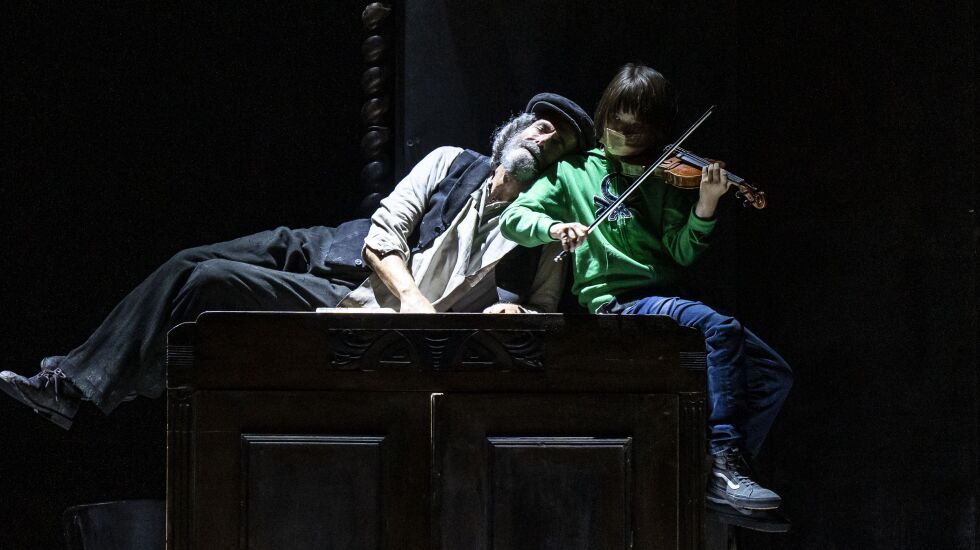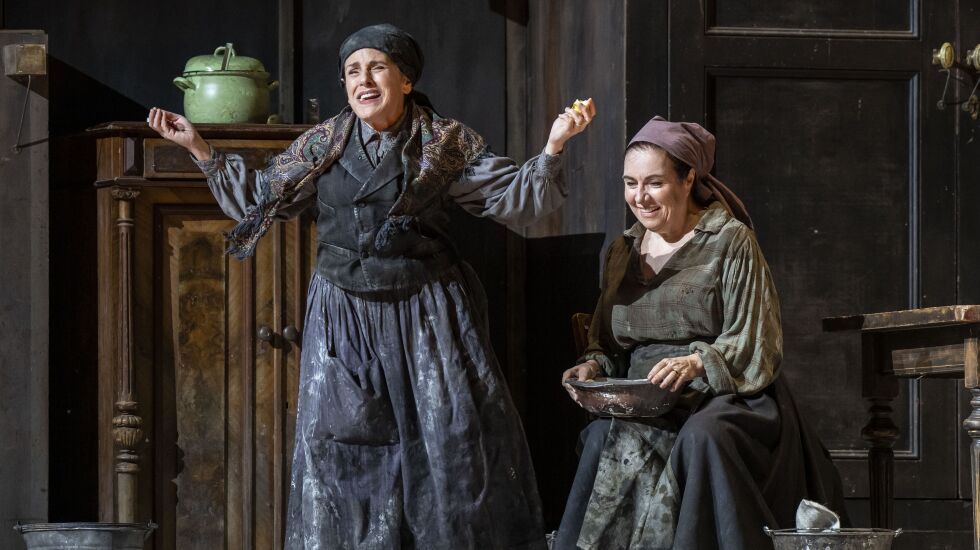
A boy very much of our time, with a bright green shirt, headphones and a scooter, rolls startlingly onto the stage of the Lyric Opera House and stops in front of a double set of doors. He opens them to reveal an unexpected, mysterious closet from which he withdraws a violin case.
He removes his headphones and turns off the throbbing music emanating from them and withdraws the violin and begins to play a familiar, alluring melody. Suddenly, there are several loud knocks from inside the closet, and finally he opens the door to reveal Tevye, an instantly recognizable character.
Immediately, it becomes clear, this boy — Drake Wunderlich, a fifth-grader who is a leading member of the Chicago Youth Symphony Orchestras’ Concert Orchestra — is the fiddler on the roof, a kind of time traveler, seer and narrator.
He magically thrusts the audience back in time to 1905 and the far expanses of the Russian Empire and literally throws open the doors to Lyric Opera of Chicago’s daring rethinking of one of the greatest Broadway musicals of all time, “Fiddler on the Roof.”
This revival, which opened Saturday evening and runs for 10 more performances through Oct. 7, is the North American premiere of a production that debuted at Germany’s Komische Oper Berlin in 2017, and it is, quite simply, a triumph in every way.
“Fiddler on the Roof” is an innately and wonderfully Jewish story, but its exploration of tradition and ritual vs. modernity and change and its themes of family life and everyday survival are universal and cut across ethnic cultures and national boundaries.
Director Barrie Kosky, who recently stepped down from heading the Komische Oper for a decade, sought to scrape away the patina of kitsch and sentimentalization that has accumulated on this 58-year-old masterwork and reveal its musical treasures and emotional core in a vibrant and affecting new way.
This fresh approach is most sharply signaled by the startlingly (yes, that word again) original scenery by designer Rufus Didwiszus. Instead of the quaint, colorful village setting that might be expected, the shtetl of Anatevka is portrayed in somber, washed-out grays with a backdrop that looks like a blurred black-and-white photo of a wintry forest, perhaps taken from a passing train.
All the first-half action takes place around a spectacular, constantly repositioned wall of used furniture that was purchased from East and West Berlin shops, each piece laden with past associations and meaning. Characters pop up in old armoires and clamor up and down and enter and exit through this unlikely assemblage.
These sets, like the production as whole, bring into relief the grim truth that is sometimes glossed over in some versions of “Fiddler on the Roof.” The Jews were diasporic people for centuries, and they were relegated in czarist Russia to what was known as the Pale of Settlement, and, as the musical makes clear, they are faced with new violence and still more resettlement as the Russian Revolution loomed.
Indeed, today’s rise of anti-Semitism across the world, the new waves of migrants in the Middle East and Africa and a war taking place in Ukraine on some of same lands where shtetls once stood only heightens the relevance and potency of this story.
But if this production shines an unblinking light on the historical reality behind “Fiddler on the Roof,” Kosky also pays abundant attention to the story’s wit, tenderness and even fun. He injects movement and verve into the big production numbers, with first-rate, tradition-tinged dancing originally choreographed by Otto Pichler.
The cast is superb from top to bottom, but at the center of it all is Tevye, one of the great characters of American theater — a hard worker, family man, folksy philosopher and all-around mensch. Steven Skybell brings him brilliantly to life with a perfect combination of whimsy, depth and humanity and the right kind of big, all-embracing voice to animate his songs.
The show’s creators made a point of giving each of the main characters a moment in the spotlight, and the actor-singers all took full advantage, including Debbie Gravitte as Golde, Tevye’s wife; Drew Redington as Motel, the shy tailor, and Austen Danielle Bohmer as Hodel, one of Tevye’s five daughters.

There are many reasons why it makes sense for Lyric Opera to take on a work like this, starting with the sheer beauty and substance of the music. At the same time, the company is able to bring a scale to this production that is simply not possible in the average Broadway theater, including a 40-voice chorus, 18 principal cast members, 12 dancers and 24 actors and supernumeraries — virtually a theatrical shtetl onstage.
Deserving considerable praise is conductor Kimberly Grigsby, making her Lyric debut, who was masterful in the pit, punctuating, supporting and urging along everything happening onstage, and drawing handsome, idiomatic playing from the orchestra, especially the klezmer stylizations of acting principal clarinetist Susan Warner and accordionist Ronnie Kuller.







